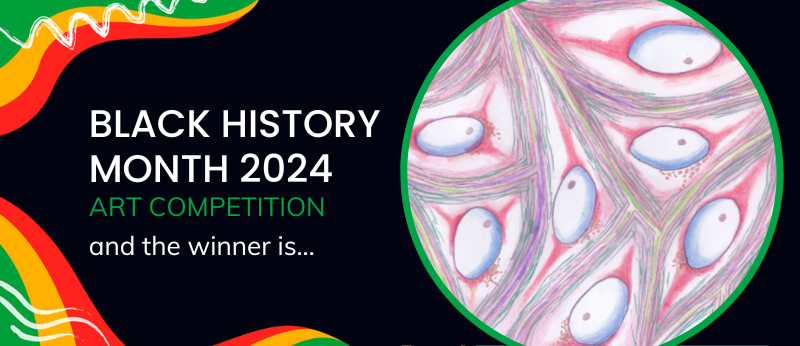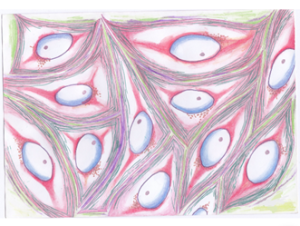
BioTechniques News
Beatrice Bowlby

We are delighted to announce that the winner of the Black History Month 2024 art competition is Cultured HeLa cells, submitted by Jeanne Pawitan!

Cultured HeLa cells
Jeanne Pawitan, Universitas Indonesia (Depok, Indonesia)
This mixed-media artwork uses pen and watercolor pencil to depict cultured HeLa cells, the oldest immortalized cell line.
Aligned with the theme of Black History Month 2024, ‘African Americans and the Arts’, we hosted a scientific art competition to honor and commemorate the impacts that Black people have had on scientific advancements. We received numerous submissions highlighting the influence of Black people on multiple fields, including ophthalmology, engineering and planetary geophysics.
The winning image commemorates someone who was not a scientist but whose cells have made an immense contribution to science and medical research.
Henrietta Lacks’ story and the impact of HeLa cells
In 1951, during her treatment for cervical cancer, samples of Henrietta Lacks’ cancer cells were taken without her or her family’s consent and given to a researcher at the hospital where she was being treated. Henrietta’s cells were cultured in the laboratory and subsequently it was discovered that they could proliferate indefinitely. These so-called ‘immortal’ cells were named HeLa cells and went on to underpin much of modern medicine [1].
Research involving HeLa cells has been documented in more than 120,00 scientific publications [2] and has contributed to numerous medical breakthroughs, from understanding the effects of X-rays on human cells to discovering that Human Papilloma Virus can lead to certain types of cervical cancer [3]. In fact, three Nobel Prizes have been awarded to research conducted using HeLa cells [4, 5, 6].
Research and racial inequity
While their impact on medicine is incalculable, the story of Henrietta Lacks also highlights the racial inequalities embedded in STEM research and brings attention to ethical issues surrounding consent, privacy and ownership of biological materials. As well as her cells being taken without her knowledge or consent and distributed globally, in 2013 the HeLa genome was published without permission from the Lacks family, sparking concerns about privacy and genetic disclosure [7].
The Lacks’ legacy
The exploitation of Henrietta has prompted researchers and the Lacks family to advocate for stronger regulations surrounding the use of biological specimens for research. In 2017, the ‘Common Rule’ was revised to require that informed consent paperwork must be clear and understandable to “enhance respect and safeguards for research participants and to increase research efficiency….” Prior to this, biospecimen informed consent could be forgone if identifying information was not present [8].
The story of Henrietta Lacks has profoundly impacted both research and the practices used, contributing to greater scientific understanding, as well as increased awareness of ethical considerations and the need for transparency and respect for patient rights.
The post HeLa cells take the prize: BHM art competition winner announced! appeared first on BioTechniques.
Powered by WPeMatico
